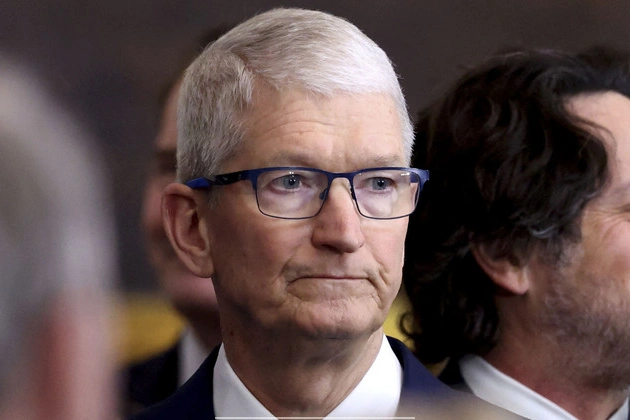
President Donald Trump has publicly targeted companies which have expressed concerns surrounding the administration’s tariff plan in recent days, threatening major brands including Apple and Walmart.
Apple in the Crosshairs
The latest target of his ire was iPhone manufacturer Apple, which Trump threatened with a company-specific tariff in a Truth Social post Friday morning.
“I have long ago informed Tim Cook of Apple that I expect their iPhone’s that will be sold in the United States of America will be manufactured and built in the United States, not India, or anyplace else,” Trump wrote. “If that is not the case, a Tariff of at least 25% must be paid by Apple to the U.S.”
This came despite Apple CEO Tim Cook making numerous attempts to curry favor with the administration since Trump took office. But Cook has also expressed concerns surrounding Trump’s tariff plan, saying earlier this month that it could increase the company’s costs by $900 million. He revealed in a company earnings call this month that Apple will shift some iPhone production from China to India, a country with which the U.S. has a better relationship with.
Apple shares fell 2.3 percent following Trump’s post, as of Friday afternoon. Cook visited the White House and met with Trump earlier this week, POLITICO previously reported.
Targeting Consumer Brands
Trump’s continued targeting of major consumer brands is the latest in the administration’s efforts to dominate global trade and prioritize U.S. manufacturing. While the president has claimed blanket widespread tariffs would encourage U.S. economic growth, markets have been volatile since his April “Liberation Day” tariff announcements and many Americans disapprove of his tariff plans.
Other companies have also caught Trump’s anger. Toy manufacturer Mattel announced this month that prices of some of its toys in the U.S. would go up, and has also expressed disinterest in moving manufacturing to the U.S., prioritizing global diversification. CEO Ynon Kreiz told CNBC earlier this month that the company is aiming for no country to represent more than 25 percent of Mattel’s sourcing.
Trump responded to the decision during remarks in the Oval Office this month.
“Let him go and we’ll put 100 percent tariff on his toys and he won’t sell one toy in the United States and that’s their biggest market,” Trump said.
Amazon, another company that’s sought a closer relationship with the administration, also faced tariff whiplash last month. After media reporting that the company would display price increases resulting from tariffs next to products, the administration called it a “hostile and political act.”
“I just got off the phone with the president about this, about Amazon’s announcement. This is a hostile and political act by Amazon,” White House press secretary Karoline Leavitt said during a briefing last month.
Trump spoke with Amazon founder Jeff Bezos following the announcement, and he said that Bezos “solved the problem very quickly.” A company spokesperson acknowledged at the time the idea was considered for one of its sites, but said the plan was “never approved and is not going to happen.”
Challenges for Walmart
A number of companies have also strayed from giving profit revenue guidance for the quarter, citing uncertainty around tariffs. Walmart was the latest company to opt out of providing specific guidance.
The company last week announced plans to pass tariff prices along to the consumer, announcing price increases on tariff-impacted merchandise this month and early summer.
The move drew ire from Trump, who wrote that Walmart should “eat the tariffs.”
“Walmart should STOP trying to blame Tariffs as the reason for raising prices throughout the chain. Walmart made BILLIONS OF DOLLARS last year, far more than expected,” Trump wrote in a Truth Social post May 17. “Between Walmart and China they should, as is said, ‘EAT THE TARIFFS,’ and not charge valued customers ANYTHING. I’ll be watching, and so will your customers!!!”
Spokespeople for Apple, Walmart and Mattel did not immediately respond to a request for comment. The White House did not immediately respond to a request for comment.
“We have always worked to keep our prices as low as possible and we won’t stop,” Walmart spokesperson Joe Pennington said in a statement to USA Today in response to Trump’s comments. “We’ll keep prices as low as we can for as long as we can given the reality of small retail margins.”











